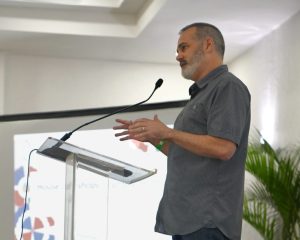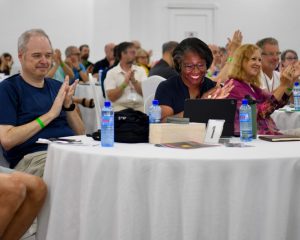Holcomb Addresses House of Bishops Gathering in Dominican Republic
- Written by Marti Pieper
- Length 3 minutes, 48 seconds
- Category Articles, Episcopal & Anglican News, Leadership
Bishop Justin S. Holcomb was invited to address the House of Bishops during their gathering in the Dominican Republic, where he spoke on the theological role of bishops in today’s world. In his message, he emphasized proclaiming the Gospel as a bishop’s central calling and urged his peers to lead with grace, speak with the voice of Christ and foster unity within a divided culture.

The Right Rev. Dr. Justin S. Holcomb spent Sept. 10-15 in the Dominican Republic attending a gathering of Episcopal bishops. The meeting, one of two annual in-person assemblies of the House of Bishops, was hosted by the Episcopal Diocese of the Dominican Republic, led by the Rt. Rev. Moisés Quezada Mota. Here, Bishop Holcomb had the opportunity to pray, convene and relax with his fellow bishops; experience support from the Most. Rev. Sean W. Rowe and his staff; visit several diocesan ministry sites; listen to various presentations; and, at the presiding bishop’s request, give an address to the House of Bishops, “The Bishop’s Voice in This Moment: Theological Reflection.” The Rt. Rev. Dr. Audrey C. Scanlan, bishop of the Episcopal Diocese of Central Pennsylvania for more than 10 years, was also invited to give an address on the bishop’s voice from her perspective.

“We say, ‘The national church,’ but The Episcopal Church is not ‘the national church,’” Bishop Holcomb said. “The Episcopal Church is present in 22 countries or territories, making it truly international, and this gathering reminded us of that. Bishop Moisés could not have been more gracious as a host; the hospitality was through the roof. I also met with Presiding Bishop Rowe and his staff numerous times. They were accessible, engaging and very encouraging.”
Overall, the bishop said, the tone was one of “love, warmth, support, friendship, assistance and wisdom. I could call any bishop right now, and they would call back and say, ‘What’s going on? How can I help? … That’s what they want to foster.”
For his address, Bishop Holcomb emphasized his primary role, which as outlined in the profile set forth by the Episcopal Diocese of Central Florida for the election of its fifth bishop, is to “proclaim and articulate the Gospel; everything else is secondary.” Noting that he is often asked to speak outside this calling, he pointed to the gospel of Christ as “the foundation for our faith and the source of peace and hope in a complex and divided world.”
Drawing from theologians including Dietrich Bonhoeffer, St. Luke the “beloved physician” (Col. 4:14) and author of Luke and Acts, Augustine, Bernard of Clairvaux, the Rev. Dr. Sarah Hinlicky Wilson, Marva J. Dawn and the Rev. Fleming Rutledge, he pointed out that “the bishop’s voice invites people to hear about the love of God and then to speak that dialect together as the church. In our moment of hot takes and weaponized shame, that means speaking at a pace and pitch that sounds like Christ.”

Bishop Holcomb presented his fellow bishops with three guiding principles for the bishop’s voice: leading with promise; telling a better story – the one that comes from God; and forming an intentional community, where “our churches can be embassies of the kingdom that proclaim to the world God’s promise and story, not a program or a platform.” Afterward, he received multiple affirmations that his words had struck home.
“I was really humbled by the response; it was very fulfilling,” he said.
“This is the main thing: Let’s be witnesses of the person and work of Jesus Christ, figure out when to be silent and when to speak,” Bishop Holcomb emphasized. “But let’s not assume that everyone wants to hear from us on all these polarizing issues when we need to shepherd a church.”
Both as a seminary professor and in his role as bishop, he has become accustomed to people disagreeing with him, but he appreciated the encouragement he received after this address. “It was a unifying moment: We are doing this together,” he said. “We are in partnership for the gospel. And that’s why I started my address to the House of Bishops by reading Philippians 1:3-5, ‘I give thanks to the Lord for you and your partnership in the gospel.’ It was a beautiful moment.”
 Email
Email